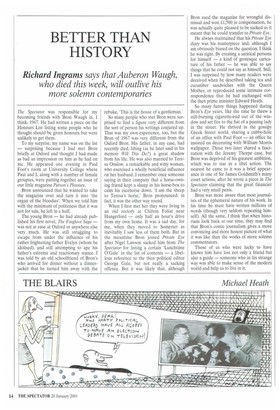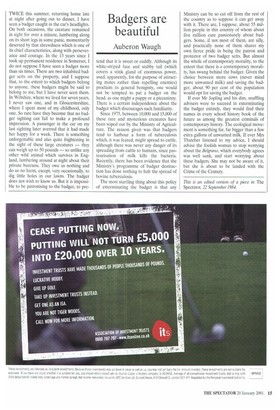BETTER THAN HISTORY
Richard Ingrams says that Auberon Waugh,
who died this week, will outlive his more solemn contemporaries
The Spectator was responsible for my becoming friends with Bron Waugh in, I think, 1967. He had written a piece on the Honours List listing some people who he thought should be given honours but were unlikely to get them.
To my surprise, my name was on the list — surprising because I had met Bron briefly at Oxford and thought I had made as bad an impression on him as he had on me. He appeared one evening in Paul Foot's room at University College where Paul and I, along with a number of female groupies, were putting together an issue of our little magazine Parson's Pleasure.
Bron announced that he wanted to take the magazine over and turn it into the organ of the bloodies'. When we told him with the minimum of politeness that it was not for sale, he left in a huff.
The young Bron — he had already published his first novel, The Foxglove Saga — was not at ease at Oxford or anywhere else very much. He was still struggling to escape from under the influence of his rather frightening father Evelyn (whom he idolised), and still attempting to ape his father's extreme and reactionary stance. I was told by an old schoolfriend of Bron's who arrived for dinner without a dinnerjacket that he turned him away with the rebuke, This is the house of a gentleman.'
So many people who met Bron were surprised to find a figure very different from the sort of person his writings conjured up. That was my own experience, too, but the Bron of 1967 was very different from the Oxford Bron. His father, in any case, had recently died, lifting (as he later said in his memoir Will This Do?) a great shadow from his life. He was also married to Teresa Onslow, a remarkable and witty woman, who exercised a wholly beneficial influence on her husband. I remember once someone saying in their company that a horse-owning friend kept a sheep in his horse-box to calm his racehorse down. 'I am the sheep to Teresa's horse,' Bron pronounced; in fact, it was the other way round.
When I first met her they were living in an old rectory at Chilton Foliat near Hungerford — only half an hour's drive from my own home. It was a sad day, for me, when they moved to Somerset as inevitably I saw less of them both. But in the meantime Bron joined Private Eye after Nigel Lawson sacked him from The Spectator for listing a certain 'Lunchtime O'Gale' in the list of contents — a libellous reference to the then political editor George Gale, but not really a sacking offence. But it was likely that, although
Bron sued the magazine for wrongful dismissal and won £1,500 in compensation, he was actually quite pleased to be sacked as it meant that he could transfer to Private Eye.
He always maintained that his Private Eye diary was his masterpiece and, although I am obviously biased on the question, I think he was right. By creating a satirical persona for himself — a kind of grotesque caricature of his father — he was able to say things that he could not say as himself. Still, I was surprised by how many readers were deceived when he described taking tea and cucumber sandwiches with the Queen Mother, or reproduced some intimate correspondence that he had exchanged with the then prime minister Edward Heath.
So many funny things happened during Bron's Eye years, like the time he threw a still-burning cigarette-end out of the window and set fire to the hat of a passing lady in the street. He thrived in the gossipy Greek Street world, sharing a cubby-hole of an office with Paul Foot — an office he insisted on decorating with William Morris wallpaper. Those two later shared a fascination with the Jeremy Thorpe case, but Bron was deprived of his greatest ambition, which was to star in a libel action. The nearest he came to it was a brief appearance in one of Sir James Goldsmith's many court actions, after he wrote a piece in The Spectator claiming that the great financier had a very small penis.
Bron was more aware than most journalists of the ephemeral nature of his work. In his time he must have written millions of words (though very seldom repeating himself). All the same, I think that when historians look back at our time, they may find that Bron's comic journalism gives a more convincing and more honest picture of what it was like than the works of more solemn commentators.
Those of us who were lucky to have known him have lost not only a friend but also a guide — someone who in his strange way was able to make sense of the modern world and help us to live in it. TWICE this summer, returning home late at night after going out to dinner, I have seen a badger caught in the car's headlights. On both occasions, the creature remained in sight for over a minute, lumbering along on its short legs in some panic, momentarily deserted by that shrewdness which is one of its chief characteristics, along with perseverance and courage. In the 13 years since I took up permanent residence in Somerset, I do not suppose I have seen a badger more than six times. There are two inhabited badger setts on the property, and I suppose that, to the extent to which badgers belong to anyone, these badgers might be said to belong to me, but I have never seen them. In Wiltshire, where we lived for seven years, I never saw one, and in Gloucestershire, where I spent most of my childhood, only one. So rare have they become that no badger sighting can fail to make a profound impression. A passenger in the car on my last sighting later averred that it had made her happy for a week. There is something unforgettable and also quite frightening in the sight of these large creatures — they can weigh up to 50 pounds — so unlike any other wild animal which survives in England, lumbering around at night about their private business. They owe us nothing and do us no harm, except, very occasionally, to dig little holes in our lawns. The badger does not wish to know us. But it is impossible to be patronising to the badger, to pre































































 Previous page
Previous page